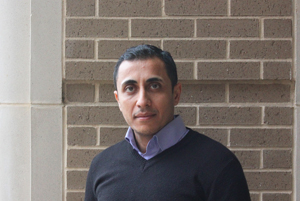ENHS student will use PhD to solve environmental challenges in Iraq
February 1, 2016

Firas Alhasson
Firas Alhasson didn’t speak much English when he moved to the United States in 2013 to pursue a PhD in environmental health sciences. Less than three years later, his research is already leading a paradigm shift in his field. With only a couple years left in his program, Alhasson plans to learn as much as possible with what’s left of his time at the Arnold School so he can help solve environmental challenges in his native Iraq.
After growing up in Basra City, Alhasson stayed in his hometown to earn a bachelor’s degree in veterinary medicine and surgery and then a master’s in histology and histopathology—both from Basra University. He then looked into an Iraqi-based scholarship program to complete a PhD in one of four countries, one of which was the United States. At the same time, a member from The Graduate School at the University of South Carolina had come to Iraq to complete a research project and recruit graduate students from Basra. “She told me and the other students about USC and provided us with forms so that we could apply,” Alhasson says.
Excited about the opportunity to earn a degree in the U.S., he learned more about Carolina and the Arnold School’s Department of Environmental Health Sciences. “My interests were a great fit, the program was highly ranked, and I really liked the community at and around USC,” says Alhasson.
After being accepted, he moved to Columbia and joined Saurabh Chatterjee’s Environmental Health & Disease Laboratory as a trainer. Before he could hit the ground running, Alhasson committed himself to developing his English language skills through USC’s English Programs for Internationals. Within a year, he was able to transition into a graduate research assistant position at the “Chatterjee Lab” and fully immerse himself in his doctoral program. “To be honest though," he says, "I’m still working on improving my English, because it takes a long time to master a language.”
Not surprisingly, Alhasson points to Chatterjee as his most important influence. “Dr. Chatterjee gives me advice whenever I need it and is like my older brother—being patient with me and very respectful, not only inside the lab but also outside,” he says. “Then I have lab mates who have become my family here in the United States. We spend a lot of time together and help each other.”
During his master’s program, Alhasson was introduced to working with disease samples that were related directly or indirectly to the environment. “Where I lived, there are several environmental problems, such as air and water pollution, due to oil handling practices and the lack of standardization among industrial facilities,” he says. “My current research builds on that experience, focusing on the relationship between environmental toxins and human diseases.”
For example, Alhasson examines the ways that byproducts of disinfected drinking water affect the liver and kidneys and is working to identify a mechanistic pathway that will impact renal function. In an important contribution to this area of research, he recently published his first paper as lead author—his fifth scholarly publication with his team members at the close-knit Chatterjee Lab.
Published in the American Journal of Physiology-Renal Physiology, the study received praise for its comprehensive and compelling data from its peer reviewers. As for Alhasson’s goal to find a new pathway for impacting renal function? One reviewer called the authors’ illustration of alternative mechanisms to be a paradigm shift for this area of research and congratulated the researchers on an intriguing and important study.
Alhasson looks forward to continuing his research at the Chatterjee Lab until he graduates in 2018. Then he plans to complete a postdoctoral fellowship before returning to Iraq to begin solving some of the environmental challenges that his homeland faces.
He believes that public health is the best way he can contribute to improving people’s lives, because it has such a big impact. “Unfortunately, people do not realize that public health is just as important as medicine and can have an even bigger effect on people’s lives,” he says. “With public health, we can mentor ourselves, our families and our communities to be our healthiest.”



_01.jpg)
_02.jpg)